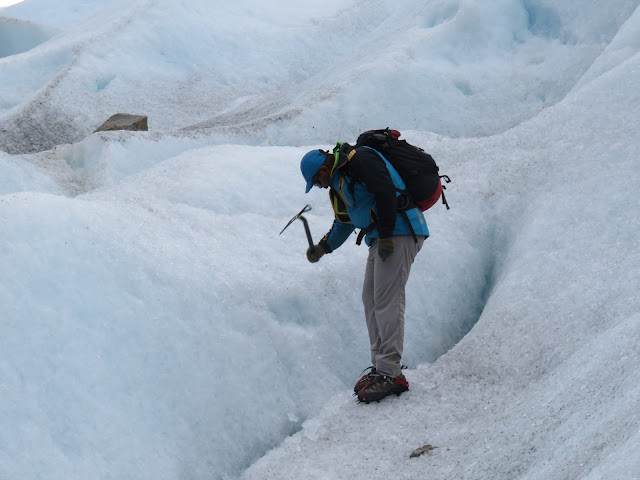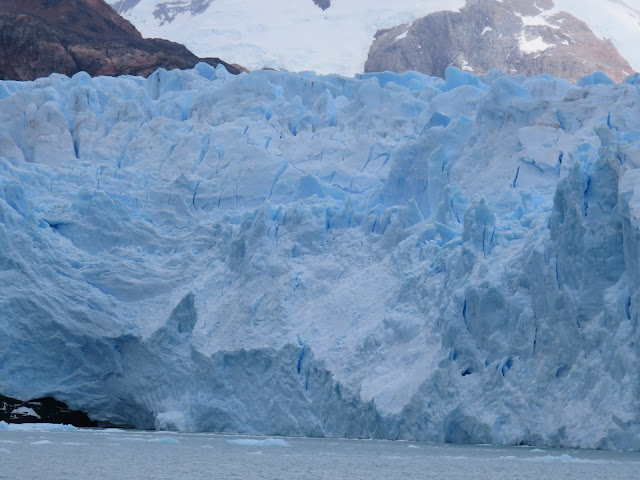A
haiku inspired by the Perito Moreno Glacier:
Walking senselessly
White monsters made of blue ice
Three point five hours
El
Calafate is located in the southern part of Patagonia, where nature is barren, wild
and beautiful. Patagonia is a sparsely
populated region shared by Argentina and Chile. The region
comprises the southern section of the Andes mountains as well as the deserts, steppes and grasslands east
of this southern portion of the Andes. Patagonia has two coasts; a western one
towards the Pacific Ocean and an eastern one towards the Atlantic
Ocean.
El
Calafate is named for the berry that, once eaten, guarantees your return to
Patagonia. I have reason to believe this
berry to be the gooseberry, as that was the jam that was available every day at
breakfast at our hotel. The hostess
actually said “grassberry” when I inquired, but I’m good with languages.
The
primary reason that El Calafate has a place on our itinerary is the Perito
Moreno Glacier (affectionately dubbed “the PMG” by me) and the opportunity to
walk on it. The PMG is located 80
kilometers west of El Calafate in the Andes mountain range. It is not Patagonia’s largest glacier, but I
dare say it is Patagonia’s most stunning glacier. The PMG is 30 kilometers long, 5 kilometers
wide and 60 kilometers high. It is a
glacier in equilibrium, or a “stable” glacier, meaning that it advances and “melts”
at the same rate, up to 2 meters per day.
When we were there, we definitely heard and (kind of) saw the PMG calving
(melting) as chunks of ice fell off the glacier into the water below. The sound of a glacier calving is not
dissimilar to the sound of thunder. The
site of a glacier calving is like nothing I have seen before. #youtubeit
To
experience the PMG, we signed up for the Big Ice tour with an operator called
Helio & Aventura. Fun fact: Only one operator is permitted by law to
offer any particular tour in El Calafate.
This keeps crowding to a minimum (sort of), but I have a feeling it also
results in higher prices. #lawofsupplyanddemand
#econmajor #gobears
The
Big Ice tour started with an 80-kilometer bus ride to the national park. We then boarded a ferry for the 20-minute ride
to the trail head, where we started our 45-minute (uphill) hike along the side
of the glacier. We then casually strolled
on to the PMG, where we walked.
Senselessly. For three point five
hours. With cramp-ons.
Cramp-ons
are spikes that you wrap around your shoes so that you can grip the surface of
the glacier as you walk. Interestingly,
walking on a glacier is kind of like walking on a literal mountain of crushed
ice. This makes complete sense as
glaciers are merely mountains of snow that have condensed into ice over
millennia and under tremendous weight.
In
my humble opinion, the glacier walk has been the highlight of the trip so
far. Words and pictures cannot justly
describe the experience but let me try.
First with words: surreal, awe-inspiring,
magnificent, majestic, I feel tiny, blue, whipped egg whites.
Now
with pictures:
Below are views from the platforms that face the PMG.
From the boat ride...
On the hike alongside the PMG:
Our guides, Luis and Gabriel. Gabriel (in the hat) was our scout:
Our three point five hour walk:
A
couple of days later, we visited the Upsala Glacier and the Spegazzini Glacier,
both located in the Andes north of the PMG.
Both are only viewable from a boat.
All three glaciers feed into Lake Argentino.
These
glaciers were equally humbling. First, the Upsala Glacier.
Now, the Spegazzini Glacier:
Here’s a beautiful blue iceberg we passed during our ride.
Photographers on the boat would take your picture in front
of the glacier if you were so inclined, which many people were. For a fee, of course. We decided to pose for our own picture, borrowing
a pose we’d seen a little boy strike.
Photo credit: Vivian Kim
Next stop: El Chalten


















































No comments:
Post a Comment